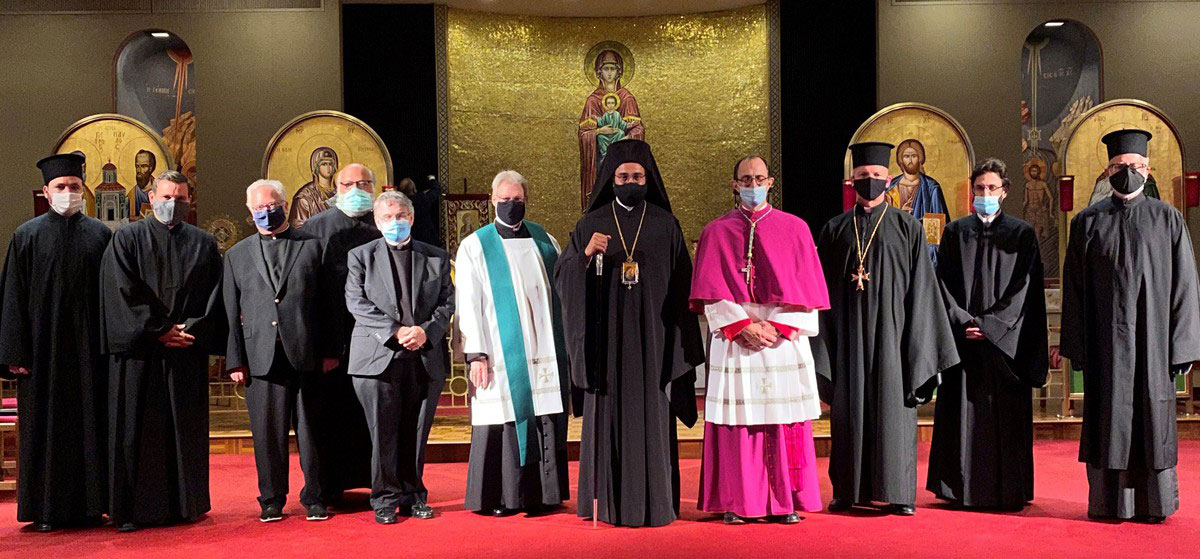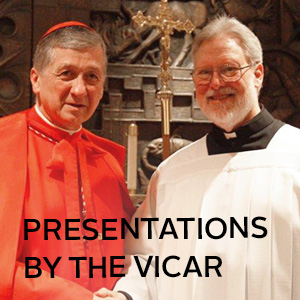Vespers for the Care of Creation
Our Lady of Perpetual Help
(PDF)
October 22, 2021
It is always good to be together, something we appreciate all the more given the experience of the pandemic, which has kept us apart. My warmest welcome to my brother Metropolitan Nathanael, and all those in his community who have joined us.
This evening we highlight the importance of “harmony and mutual encouragement” among religious leaders and the scientific community as it relates to combatting our current ecological crisis. We take our inspiration from St. Paul, who implores his fellow Christians in Rome to live in “perfect harmony” with one another. He particularly urges them to be patient with and encourage each other.
Nearly 2000 years later, the Greek Orthodox and Roman Catholic Churches honor this good counsel by our commitment to gather together as Christian brothers and sisters every year to join hands and hearts in common cause to care for God’s wondrous creation and at the same time give witness to our belief in the interconnectedness of all that God has made.
As important as our local efforts are, we continue to be impacted by the witness and leadership of Pope Francis and Ecumenical Patriarch Bartholomew for Creation care. For example, on October 4, the feast of St. Francis of Assisi, the Holy Father and the Ecumenical Patriarch joined other Christian and religious leaders at the Vatican to encourage each other as people of faith committed to addressing the climate crisis we now face. Each spoke out of the respective riches of his or her own religious tradition and all arrived at a similar conclusion, we must speak together as religious leaders about the perils of climate change, particularly about its impact on the most vulnerable among us.
“Recognizing that the world is interconnected means not only realizing the harmful effects of our actions, but also identifying behaviors and solutions to be adopted, in an attitude of openness to interdependence and sharing. We cannot act alone, for each of us is fundamentally responsible to care for others and for the environment. This commitment should lead to an urgently needed change of direction, nurtured also by our respective religious beliefs and spirituality.” [Pope Francis, 10/4/21 Address]
That gathering, like our ecumenical gathering tonight, should impress upon us all that the time for acting alone to address climate change is no longer an option, we should and must work together.
Let me highlight three insights offered in our readings tonight and echoed by recent statements of religious leaders. The first is an appreciation of the spiritual understanding of the “interconnectedness of all,” central themes at the interreligious gathering on October 4, in Laudato Si and in the creation account from Genesis 1:1-2:3.
In the very first lines of the Bible we hear the refrain “and God saw that it was good,” which is repeated throughout the first chapter of Genesis. Waters, Land, Creatures, Plants: an interconnected matrix of creation willed by God – all created before humans.
As Pope Francis underscored in remarks for the October 4 gathering, the interconnectedness of our world has a deeply spiritual meaning for us. “We recognize the signs of divine harmony present in the natural world, for no creatures are self-sufficient; they exist only in dependence on each other, complementing one another and in the service of one another.” (cf., LS 86)
It is this recognition that gives Christian spirituality the passion to care for and protect the world and all humans and impels us to reconcile our personal values with our everyday practices. As such, Christian spirituality ignites personal and social love (cf., LS 231), because it favors “sobriety and humility” at a personal level (LS 224), while increasing “the capacity for living together in communion” (LS 228), moving from indifference to loving awareness, and from individualism to solidarity (cf., LS 220). But for our spirituality to be authentically Christian it must be radical, equal to the radical changes we must make to save human society and our common home. It must be a radical spirituality that is unafraid to speak of the need for sacrifice as a vital element that must occupy a central role in the transition to a sustainable planet with a just economy. Too often sacrifice is a topic that is usually avoided in discussions of how to meet the ecological crises. Some fear that if we call people to make personal sacrifices to promote an equitable economy, we will make it more difficult to form a consensus supporting climate justice or such a call will be distorted by climate deniers to make the pathway to sustainability seem impossible.
But the world’s great religious and ethical traditions know the value of sacrifice and we can do a great service to humanity by recovering these traditions. It might seem that a society such as ours has lost its capacity for sustained sacrifice, or at least lost sight of the ennobling role that sacrifice can play in our individual and communal lives. But if we look more deeply, we find in the enormous sacrifices that families make for their children a proclamation that sustained sacrifice is in fact all around us.
This is the lynchpin for building a public ethic of sacrifice in pursuit of a just and sustainable world. Pope Francis devotes tremendous attention in Laudato Si’ to the ethic of intergenerational responsibility, which is ultimately rooted in the spirituality of sacrifice for those who will inherit the planet. We must be willing to publicly advance such an ethic, not as a position we grudgingly acknowledge the need for, but as the great moral call of our age.
A second theme to consider is the value of collaborative dialogue among religious leaders and scientific experts.
As we heard in the first reading, Paul insisted that the Christians of Rome live in harmony, mutually supporting and encouraging one another. His admonition compels us to do likewise. Reading the signs of our current times, it is vital that we integrate not only our shared spiritual wisdom in seeking the harmony we require to address climate change, but the knowledge of the scientific community as well. We must resist pitting scientific truth against religious truth, as some seem to do today.
One obvious example is the ongoing Covid-19 pandemic and the amazing advances of the scientific community in developing effective vaccines for the pandemic.
Tonight, we also need to highlight the overwhelming consensus of the scientific community that we have arrived at a moment of climate crisis that needs our immediate attention if we want to harbor any hope of averting this crisis for present and future generations. I look forward to hearing the insights of tonight’s speaker, Doug Farr, whose architectural work applies scientific advances to lessen the impact of ecological concerns.
A final theme to ponder is the need to understand the imperative of addressing climate change as it relates to our preferential option for people who are poor.
Recall the first line of Psalm 41, which appeared near the outset of our Vespers tonight. To quote: “Happy the man who considers the poor and the weak. The Lord will save him in the day of evil, will guard him, give him life…” The Psalmist here reminds us that those who have been gifted with resources and means have the duty to address the needs of people who are poor and vulnerable in their midst.
Earlier I noted that we should recover the insights of the world’s great religious and ethical traditions that call us to individual and societal sacrifice to save our planet. Those same spiritual and moral traditions are equally united in demanding that the marginalized must not bear heavy burdens in moving to planetary sustainability. Catholic social teaching identifies this concern as the preferential option for people who are poor.
In this first of its kind joint statement, Pope Francis, Archbishop of Canterbury Justin Welby and Ecumenical Patriarch Bartholomew encouraged Christians to pray that world leaders at the United Nations Climate Change Conference (COP26) in Glasgow make courageous choices which would benefit those most impacted by climate change, namely poor people.
"We call on everyone, whatever their belief or world view, to endeavor to listen to the cry of the Earth and of people who are poor, examining their behavior and pledging meaningful sacrifices for the sake of the Earth which God has given us," the message said.
The statement also makes clear that those most impacted by the devastating effects of climate change are those least at fault for it. It therefore calls on wealthy nations to take responsibility for their actions out of a sense of justice and make the requisite changes needed to heed the cries of people who are poor.
Ecumenical Patriarch Bartholomew, Pope Francis and other religious leaders have been clear about the interconnected nature and complexity of the challenges we face, and the need to address them in unity, ever mindful that it is in God we trust. It is up to us to put aside any false idols and continually respond to the call to take up the mission of promoting a more just, equitable and loving future. Let us be reminded that the mission to care for each other and for the Earth belongs to each and everyone of us. Let our faith ignite us to take bold action, grateful for the contributions of science and undaunted to make the sacrifices required to save the planet. And let us not be discouraged by the work ahead. Instead, let us trust and rejoice in God’s promise to make all things new (Rev. 21:5), and take to heart the encouragement the Holy Father offers when he tells us that in spite of the practical relativism and consumer culture we live in, “all is not lost. Human beings,” he notes, “while capable of the worst, are also capable of rising above themselves and their mental and social conditioning, choosing again what is good, and making a new start. No system can completely suppress our openness to what is good, true and beautiful, or our God-given ability to respond to his grace at work deep in our hearts. I appeal to my sisters and brothers throughout the world not to forget this dignity which is ours” (LS 205).

